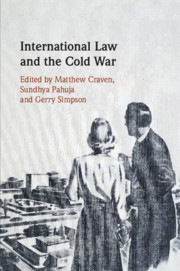Book contents
- International Law and the Cold War
- International Law and the Cold War
- Copyright page
- Dedication
- Contents
- Figures
- About the Editors
- About the Authors
- Acknowledgements
- 1 Reading and Unreading a Historiography of Hiatus
- Part I The Anti-linear Cold War
- Part II The Generative/Productive Cold War
- Part III The Parochial/Plural Cold War
- 16 The Cold War in Soviet International Legal Discourse
- 17 The Dao of Mao: Sinocentric Socialism and the Politics of International Legal Theory
- 18 ‘The Dust of Empire’: the Dialectic of Self-Determination and Re-colonisation in the First Phase of the Cold War
- 19 The ‘Bihar Famine’ and the Authorisation of the Green Revolution in India: Developmental Futures and Disaster Imaginaries
- 20 Pakistan’s Cold War(s) and International Law
- 21 International Law, Cold War Juridical Theatre and the Making of the Suez Crisis
- 22 To Seek with Beauty to Set the World Right: Cold War International Law and the Radical ‘Imaginative Geography’ of Pan-Africanism
- 23 John Le Carré, International Law and the Cold War
- 24 Postcolonial Hauntings and Cold War Continuities: Congolese Sovereignty and the Murder of Patrice Lumumba
- 25 End Times in the Antipodes: Propaganda and Critique in On the Beach
- References to Cold War Volume
- Index
18 - ‘The Dust of Empire’: the Dialectic of Self-Determination and Re-colonisation in the First Phase of the Cold War
from Part III - The Parochial/Plural Cold War
Published online by Cambridge University Press: 05 December 2019
- International Law and the Cold War
- International Law and the Cold War
- Copyright page
- Dedication
- Contents
- Figures
- About the Editors
- About the Authors
- Acknowledgements
- 1 Reading and Unreading a Historiography of Hiatus
- Part I The Anti-linear Cold War
- Part II The Generative/Productive Cold War
- Part III The Parochial/Plural Cold War
- 16 The Cold War in Soviet International Legal Discourse
- 17 The Dao of Mao: Sinocentric Socialism and the Politics of International Legal Theory
- 18 ‘The Dust of Empire’: the Dialectic of Self-Determination and Re-colonisation in the First Phase of the Cold War
- 19 The ‘Bihar Famine’ and the Authorisation of the Green Revolution in India: Developmental Futures and Disaster Imaginaries
- 20 Pakistan’s Cold War(s) and International Law
- 21 International Law, Cold War Juridical Theatre and the Making of the Suez Crisis
- 22 To Seek with Beauty to Set the World Right: Cold War International Law and the Radical ‘Imaginative Geography’ of Pan-Africanism
- 23 John Le Carré, International Law and the Cold War
- 24 Postcolonial Hauntings and Cold War Continuities: Congolese Sovereignty and the Murder of Patrice Lumumba
- 25 End Times in the Antipodes: Propaganda and Critique in On the Beach
- References to Cold War Volume
- Index
Summary
When Charles de Gaulle learned that France’s former colonies in Africa had chosen independence, the General shrugged dismissively: ‘[t]hey are the dust of empire’. This disdain toward the non-Euro others characterised as Eurocentrism is typical of, and almost defines approaches to, the post-Westphalian order. This disdain is naturalised in the early era of what I have elsewhere called ‘conquest colonisation’, where resources, territories, nations and even people are plundered and looted, and governance by predation and the politics of discrimination prevail. Paradigmatically, conquest globalisation engages in ruthless subjugation of peoples marked by the altogether resolute denial of their humanity and confiscation of their natural habitat, social relations and human resources. At times, it even entails the total physical destruction of peoples, or cultural destruction, as the histories of indigenous peoples everywhere testify. Conquest globalisation founds itself on, and takes pride in, reiterating and calibrating various forms of production of human rightlessness of the subjugated peoples.
Keywords
- Type
- Chapter
- Information
- International Law and the Cold War , pp. 397 - 413Publisher: Cambridge University PressPrint publication year: 2019

